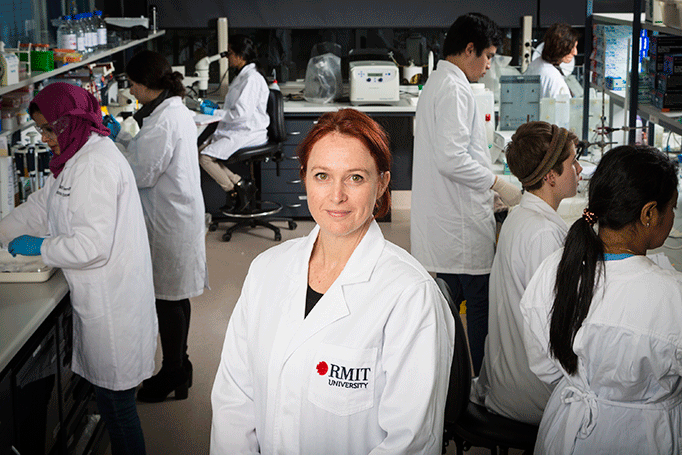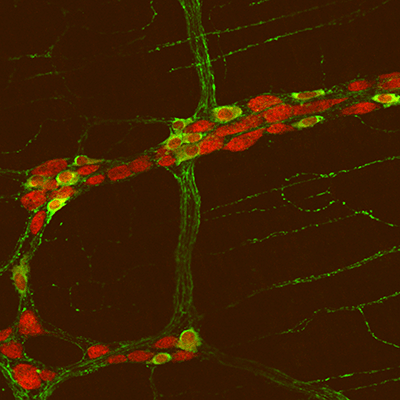Researchers have confirmed there is a gut-brain nervous system link in autism.
They say it opens a new direction in the search for potential treatments. Such treatments could ease behavioural issues associated with autism by targeting the gut.
People with autism often suffer from gut problems. The researchers have discovered the same gene mutations – found in the brain and the gut – could be the cause.

Chief investigator Elisa Hill-Yardin: “It broadens our horizons in the search for treatments”
‘We’ve confirmed the brain and gut share autism-related gene mutations’
The chief investigator was Associate Professor Elisa Hill-Yardin, of RMIT University in Melbourne, Australia. She is an ARC Future Fellow and Vice-Chancellor’s Senior Research Fellow in RMIT’s School of Health and Biomedical Sciences.
She said scientists trying to understand autism have long been looking in the brain. However, the links with the gut nervous system have only been recently explored.
“We know the brain and gut share many of the same neurons and now for the first time we’ve confirmed that they also share autism-related gene mutations,” Hill-Yardin said.
“Up to 90 per cent of people with autism suffer from gut issues, which can have a significant impact on daily life for them and their families.
“Our findings suggest these gastrointestinal problems may stem from the same mutations in genes that are responsible for brain and behavioural issues in autism.”
She added: “It’s a whole new way of thinking about it – for clinicians, families and researchers – and it broadens our horizons in the search for treatments to improve the quality of life for people with autism.”
Autism gene and gut-brain link

Neurons in the gut of a mouse with the autism-related gene mutation. The study found mice with the mutation had more neurons in the small intestine
The study reveals a gene mutation that affects neuron communication in the brain. It was first identified as a cause of autism and now has been found to cause dysfunction in the gut.
The research brings together new results from preclinical animal studies with previously unpublished clinical work. The previously unpublished work was from a landmark 2003 study led by Swedish researchers and a French geneticist.
The study of two brothers with autism by Professor Christopher Gillberg (University of Gothenburg), Professor Maria Råstam (Lund University) and Professor Thomas Bourgeron (Pasteur Institute) was the first to identify a specific gene mutation as a cause of the neurodevelopmental disorder.
This mutation affects communication by altering the ‘velcro’ between neurons that keeps them in close contact.
The 2003 study focused on identifying the genetic basis for autism. However, Gillberg and Råstam also took detailed clinical notes of the brothers’ significant gastrointestinal problems.
Researchers in the Gut-Brain Axis team at RMIT have built on this clinical work with a series of studies on the function and structure of the gut in mice that have the same ‘velcro’ gene mutation.
The team found this mutation affects:
- Gut contractions
- The number of neurons in the small intestine
- The speed that food moves through the small intestine
- Responses to a critical neurotransmitter important in autism. These were well known in the brain, but not previously identified to play any major role in the gut
One of more than 150 mutations that alter neuronal connections
Associate Professor Ashley Franks of La Trobe University in Melbourne, a collaborator in the project, also found significant differences in the gut microbes of mice with the mutation and those without it. These differences existed even though both groups were kept in identical environments.
While this specific ‘velcro’ mutation is rare, it is one of more than 150 autism-related gene mutations that alter neuronal connections, Hill-Yardin said.
She added: “The link we’ve confirmed suggests a broader mechanism, indicating that the mutations that affect connections between neurons could be behind the gut problems in many patients.”
Promising paths for future research
Hill-Yardin said the work identifies a new target for the development of therapies. Scientists would design these specifically to work on neurotransmitters in the gut.
“We’ve also identified that there’s a need to better understand how existing autism medications that target neurotransmitters in the brain are affecting the gut,” she said.
“Another promising path for future research is investigating how gene mutations in the nervous system relate with microbes in the gut.
“We know these microbes interact with the brain via the gut-brain axis, so could tweaking them improve mood and behaviour?
“While this wouldn’t reverse the gene mutation, we might be able to tone down its effects, and make a real difference in the quality of life for people with autism and their families.”
The research, with collaborators from University of Gothenburg and Lund University (Sweden), Baylor College of Medicine (US), University of Minho (Portugal), La Trobe University, The University of Melbourne, Florey Institute of Neuroscience and Mental Health and Monash University (Australia), is published in a forthcoming edition of Autism Research (DOI: 10.1002/AUR.2127).
Related:
- Study seeks proof of gut link to autism
- Evidence grows for autism link to gut
- Study reinforces role of gut health
- Food enzyme tested as autism treatment
- Study finds faecal transplants effective
Published: 30 August 2019















